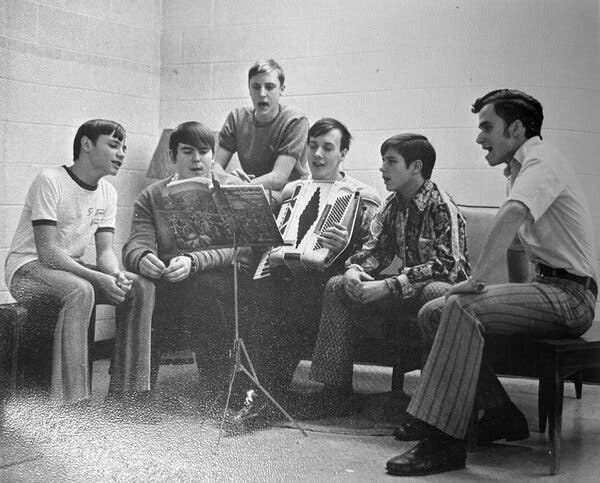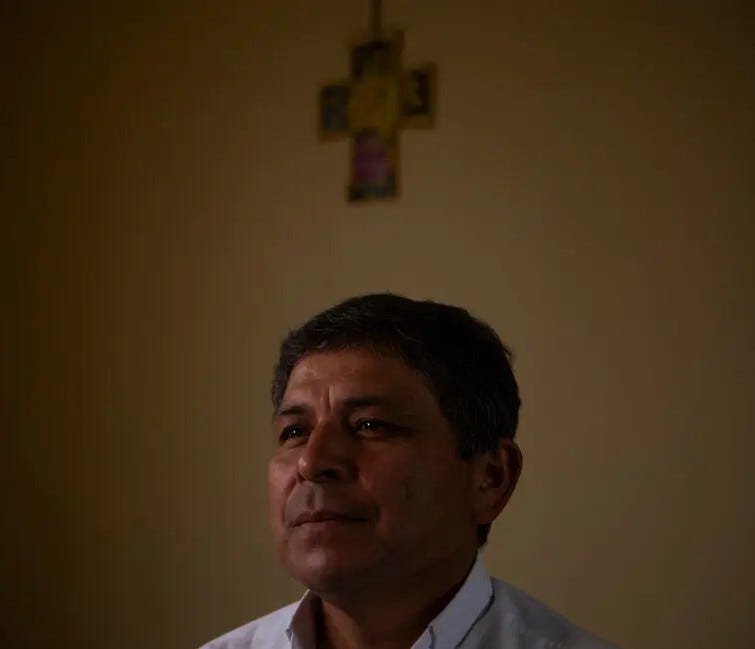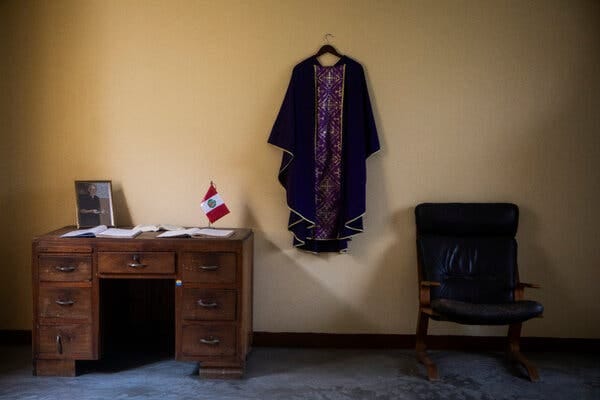Note: this newsletter is also available at the betterpolitics.substack website, which gives access to dozens of previous posts.
In what follows, I will primarily cite some excerpts from an excellent new story from today’s New York Times that is subtitled “How Fr Bob Became Pope Leo” to encourage everyone to read the whole thing.
As I overcame an initial struggle in coming to appreciate Pope Francis by investing considerable time to learn about him, I would encourage especially every Catholic of good will to invest the time to learn to know and love our new Holy Father. This is especially important to do now, when he is getting a relatively warm reception from a wide range of commentators, and before the inevitable criticisms emerge.
[An undated photograph of Robert Prevost. Credit Augustinian Province Of Our Mother Of Good Counsel, via Reuters]
My excerpts and remarks reflect not only my social Catholic emphasis on how his example and leadership can help us respond to the signs of our times. They also reflect my over two decades of work in seminary formation which included what we called human (i.e., growth in virtue), intellectual, spiritual, and pastoral dimensions. All of these, I liked to emphasize, were dimensions of being conformed to Christ for a particular way of sharing in his redemptive work.
The Formation of a Future Pope
Prevost’s natural gifts, family upbringing under the care of devout parents, and incorporation into the Catholic faith from his youth, provided solid foundations for more formal training for ordination, and subsequent experience. Through some combination of natural inclinations and spiritual gifts, it seems that he had a strong inclination toward virtue and piety from his youth. There must have been something extraordinary about the young Bob Prevost for an elderly woman who lived across the street to tell him “when he was only a boy, that she thought he would be the first American pope.”
He was clear enough about his calling to the priesthood that
After only the eighth grade, he ventured out of his tight-knit community to attend St. Augustine Seminary High School near Holland, Mich., a boarding school for boys exploring a life in the priesthood.
Although the young Prevost wanted to be a priest from his youth, the Times story reveals that he was not without some brief times of doubt. It recounts the following discussion with his father.
“Maybe it would be better I leave this life and get married; I want to have children, a normal life,” the future pope, in a 2024 interview on Italian television, recalled saying. His father responded, he said, in a very human but deep way, telling his youngest son that, yes, “the intimacy between him and my mom” was important, but so was the intimacy between a priest and the love of God.
The Times observes that “[t]he conversation eased the conscience of Prevost, then a young and deeply spiritual man with a fondness for striped trousers, St. Augustine and math equations.”
[Prevost, right in his striped bell-bottoms, photo from the 1973 High School yearbook. Credit...Ted Jungblut/St. Augustine Seminary High School]
Regarding intellectual formation, Prevost was among the most gifted naturally, and worked hard. It is interesting that he decided to major in mathematics even though he was in remote preparation for becoming a priest. The Times writes:
Prevost gained a reputation as one of the brainier students, taking Hebrew and Latin even though he was not majoring in Scripture. (“Bob, it’s like, really?” said Father Pizzo.) He read a ton of St. Augustine.
His reading of Augustine contributed to all dimensions of an integral formation, including human, intellectual, spiritual, and pastoral. The Times story discusses how:
He became steeped in the Augustinian emphasis on friendship and community, but also did not separate himself from the outside world. After speaking with his father and formally entering the Order of St. Augustine to prepare for the priesthood, he pursued his Master of Divinity at Chicago’s Catholic Theological Union. It was an institution with an ecumenical spirit physically and ideologically close to other divinity schools, allowing for students from different traditions to share ideas.
Formation for the Signs of Our Time
Regarding Pope Leo XIV’s formation for our tumultuous moment in human history, the Times article begins by recounting some highlights from his time in Peru during years of internal violence under an authoritarian president who wanted more military recruits, and soldiers tried to conscript some seminarians under the care of young Fr. Bob. His response illustrates his virtues of courage and prudence, his intellectual preparation, and his way of exercising pastoral leadership under threatening circumstances, all of which reflects his spiritual depth.
It was the mid-1990s, and the troops, armed to the teeth, had stopped and boarded a minibus carrying the American priest and a group of young Peruvian seminarians. The soldiers tried to forcibly recruit the men.
Citing a law that exempted clerics from military service, Father Prevost told the soldiers, “No, these young men are going to be priests, they cannot go to the barracks,” said the Rev. Ramiro Castillo, one of the seminarians in the van. “When he had to speak, he spoke.”
[Fr. Ramiro Castillo this week in Peru. Photo Mark Garro for the New York Times]
The Times notes how as Pope Leo XIII now
takes over an often divided Roman Catholic Church and the most prominent pulpit on earth, his voice will be heard globally when authoritarianism is on the rise, technological leaps are disrupting society, and the most vulnerable are being threatened by conflicts, economic inequality and climate change.
Pope Leo XIV’s response to these times will build upon his experience. He was in college at a time when “[p]rotests and debates over hot-button issues, like the ordination of women as priests, roiled the campus, but classmates remembered Prevost as reserved and hard to read, except in his obvious commitment to the downtrodden.” He “worked with alcoholics and addicts…drove a stick-shift Ford, went to hospitals and bars to respond to people in need. He showed up when his friends in the order lost loved ones and became a dependable sounding board.”
When an Augustinian colleague had holes in his shoes during a snowy Chicago winter and his superior had doubted whether he needed new ones, the practically inclined Prevost told him “to buy shoes and give the superior the receipt,” because “Our vow of poverty doesn’t mean we live in abject poverty.” Here, on the other hand, is his former room in Peru, which is not that of someone who indulges in opulence.
[Some of Prevost’s personal items on display this month in his former room at the Santo Tomas de Villanueva convent in Trujillo, Peru.Credit...Marco Garro for The New York Times]
This fine story also gives good insights about how he responded to live under the crackdowns of an authoritarian government.
After the Peruvian president at the time, Alberto Fujimori, dissolved Congress and showed little regard for human rights ahead of his re-election in 1995, Prevost and others in the Augustinian community started taking part in demonstrations, carrying signs that read, “If you want peace, work for justice,” Father Lydon, who lived with Prevost in the Augustinian community, said, referring to Pope Paul VI.
They organized a concert in the main square of Trujillo to honor the victims of violence committed by both guerrillas and government death squads. A band of seminarians played a protest song about the 1992 massacre of university students whose remains had been given to their families in milk boxes.
Prevost emerged as a voice against authoritarian abuses, including convictions without due process, for which he sought pardons. “He had a deep grasp of Latin America’s reality,” said Diego García Sayán, a former justice minister in Peru.
By the late 1990s, the brainy student had reinvented himself as a courageous pastor in Peru, burnishing his credentials in the order.
In summary, he was more inclined to serve the downtrodden than to intervene in public affairs. When the situation demanded it, he was not afraid to say “no” to those threatening him with guns, and he was prepared to defends rights with reference to law. Out of a deep understanding of the socio-political realities, he similarly took part in street demonstrations on behalf of justice and peace, emerging as a courageous voice against authoritarian abuses.
We have seen from other stories how he continued—at least until recently—to speak daily with his brothers, including one who is an outspoken supporter of MAGA. This times story also explains how his “His families, old and new, intertwined” as his widower father “stayed with him and the other Augustinians for more than a month in their rectory, cooking meals and participating in the fraternal life.”
The times story also discusses in detail how his globe trotting diplomacy as head of the Augustinians has provided him with a rare degree of familiarity with the situation around the globe.
[Prevost in 2007 in Papua, Indonesia.Credit...Alexander Palliparambil Joseph]
This global perspective presumably weighed heavily with the College of Cardinals in their quick but surprising consensus that this American-born man—whom Peru and Latin America also claim as their own—was the best choice to lead the Church.
The article concludes with a discussion of how Pope Francis came to put him on the fast track to becoming the next pope. In 2004, the then Fr. Roberto Prevost and head of the Augustinian order had come to know the Cardinal Archbishop Bergoglio of Buenos Aires. “They were not entirely in sync,” so when Francis became pope in 2013, Prevost told some of his confreres “Thank God, I’m never going to become bishop.” He later explained that “not all of my encounters with Cardinal Bergoglio ended in agreement.”
When he completed his second term in Rome as head of the Augustinians, Prevost was preparing to return to Chicago when Pope Francis instead sent him back to Peru as Bishop, where he was elected to head the Episcopal Conference. His impressive leadership in Latin America apparently encouraged the rapidly declining, but politically astute, Pope Francis to put him on the fast track to becoming the next pope.
This fact would seemingly make the strong contingent of conservative American Catholics who expressed such strong opposition to Pope Francis wary of our new Pope Leo XIV. With a relatively small number of notable exceptions, the response of American Catholics to Pope Leo has been marked primarily by joy and hope. This is certainly a reflection of the fact that he seems to be so eminently qualified for a job that far exceeds human strength.
As we continue to get to know him, we should also establish the habit of praying regularly for Pope Leo XIV and his ministry in the Church. We should also pray that he will not only be given the wisdom to lead the Church at this time, but that people will receive his teaching.
As Pope Leo XIV has clearly indicated, this includes emphases that will be difficult for many American Catholics to accept. For influential Catholic postliberals, these will include the open and constructive orientation of the Second Vatican Council regarding the modern world of constitutional democratic states and human rights. For others who are committed to a politically and ideologically tainted social conservatism, this will include Leo’s promotion of the integral and solidary Christian humanism of Catholic Social Doctrine, which locates Catholic teaching on human sexuality, marriage and life ethics within a quite distinct framework from their approach in alignment with the conservative side of the culture wars. Regarding pastoral approach, Leo’s pontificate will apparently follow Pope Francis’s emphasis on welcoming and accompanying everyone, as he made clear with his emphasis on “tutti, tutti” (all, everyone). It will also include a more synodal model of governance, from a fundamental perspective of believers walking together on the road of missionary discipleship with Jesus.
God willing, our new Pontiff will be able to build bridges and consensus on these important priorities.









